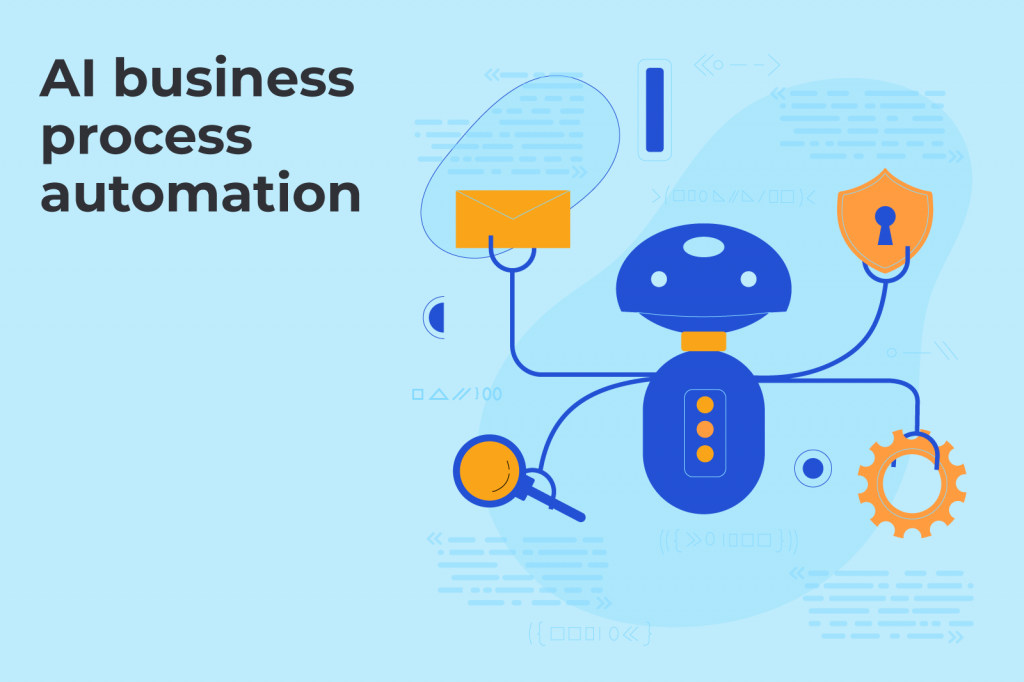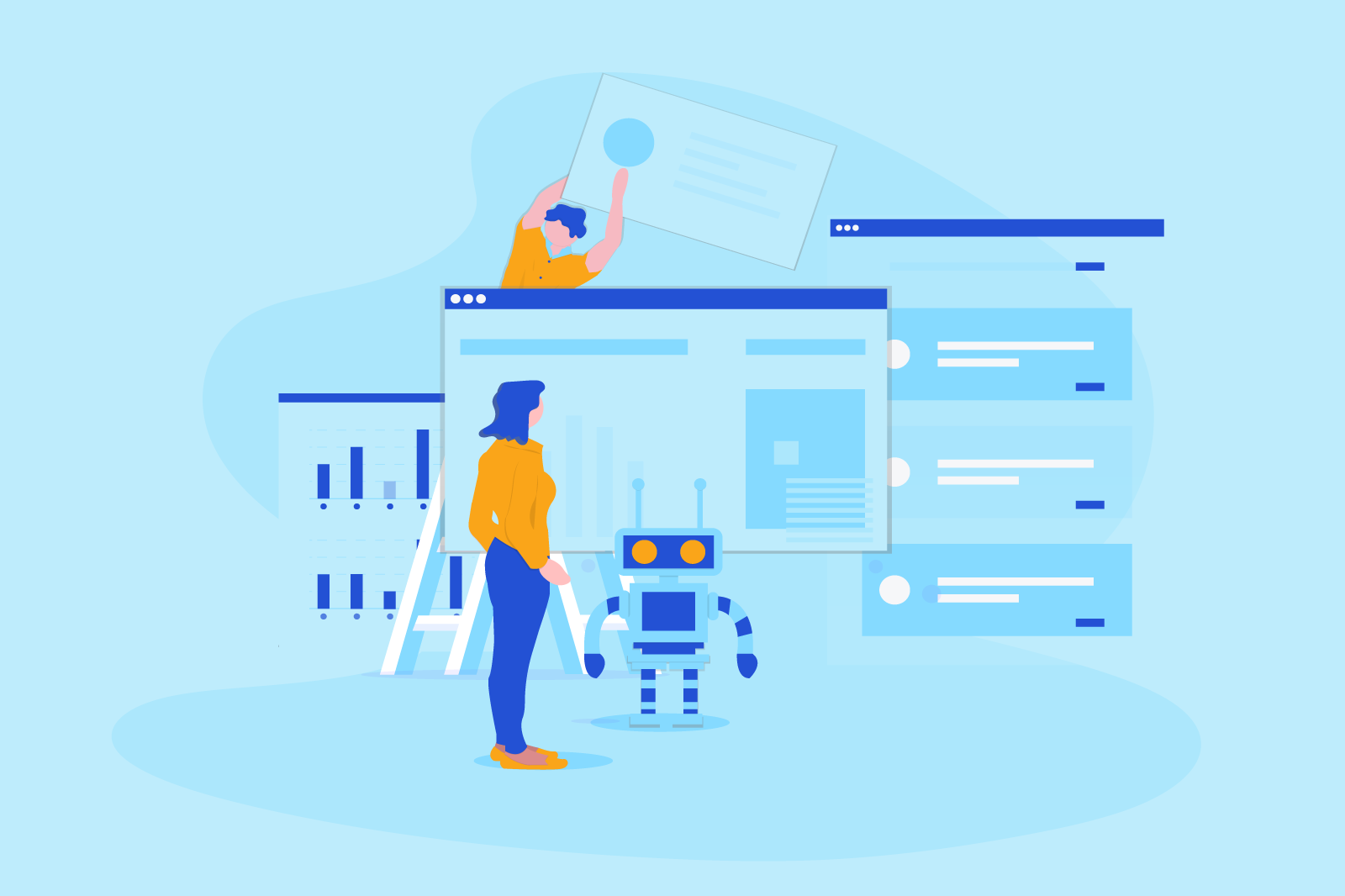
AI business process automation
Business process automation (BPA) is nothing new; actually, it has been quite the buzzword in the last few years, and it’s understandable based on the positive business outcomes in terms of efficiency and productivity. But now, we have a new kid on the block named AI business process automation, which promises to skyrocket businesses to a new era of improved business results and processes. To declutter what this is all about, we spoke with our AI software development team at Ontegra to help you with the core ideas and principles highlighted in this article.
Why is business process automation with AI such a big deal?
The limitation of business automation until now has been related to its heavy relation to a rule-based process. Simply, business processes are automated by providing clear instructions and rules. Now, with the use of AI, business automation gets embedded with “Intelligence,” and thus, can learn and adapt - similar to how humans do it.
There are three main areas where AI can change the rules of the game in business automation:
Data analysis - Here is where AI can genuinely shine based on its ability to tackle massive amounts of data. It can analyze, organize, extract the most valuable data, and identify patterns and insights, providing executives with the right tools for better strategic decisions (and faster).
Process building - Businesses working with process automation know how difficult it can be to create a perfectly functional business process based on parameters and input. AI can delve into the process and help teams develop better automation processes faster.
Automation - AI provides the opportunity to automate repetitive tasks, especially those that usually require a lot of time and effort, thus freeing up time and resources for strategic thinking and creativity.
AI automation business ideas
One of the best examples of AI automation in business is its inclusion in the CRM game. Most companies of all sizes use CRMs, so we believe this is one of the best examples to showcase its potential.
Data entry is critical to a CRM, but as you know, it’s time-consuming and prone to errors, and, let’s be honest, nobody truly enjoys it as it’s repetitive and quite dull.
This process can be automated entirely through AI's natural language processing capabilities. The system can read emails and chat messages and even tap into phone call recordings to extract the relevant information and send it to your CRM in the proper format. Sounds great? - It’s even better because the process is much faster and almost error-free, which could provide your team breathing space to nurture the relationship with customers, create new strategies, and more.
To recap, let’s see how your CRM processes look like without AI and how they benefit from AI:
Without AI
The processes are rule-based, and the system has limited data analysis capabilities. They also require human intervention to examine, extract, and organize the data. Data entry in your CRM is manual.
With AI
The system can learn and adapt, which provides a more future-proof solution. The data analysis is greatly enhanced, and the data entry in your CRM can be completely automated.

More automation business examples
Supercharging your CRM with AI is one of the most common examples, but AI’s potential in the process automation world is almost unlimited. Here are some further examples of where we could help your business excel:
Invoice processing
AI can help extract and validate critical information such as invoice data (amount, date, client). It can automate the approval workflow by routing the approval channels and integrating with your CRM to update the financial records. Furthermore, AI can perform automated matching processes to compare purchase orders, delivery receipts, and invoices - any discrepancy can be flagged to reduce the risk of overpayment or financial inaccuracy. If that’s not impressive yet, it can have a significant role in audits because it can create audit trails with detailed reports to enhance transparency and data accuracy.
Marketing and sales
In marketing, automating business processes with AI can go a long way. For example, you could automate the entire flow of email/SMS campaigns and also provide improved personalization. The system can create segmentation based on behavior, attributes, customer value, etc. Emails and text messages can be sent automatically, and the content can be automated based on their preferences, resulting in improved conversion rates, engagement, and open rates.
In sales, you could automate price quoting and offers, improve the approval process for discounts or contract reviews, and improve your lead management by analyzing prospects' behavior to assign different scores based on their conversion likelihood. This way, your sales team can focus more on the more qualified leads.
Operations and Supply Chain
Inventory management is such an important thing, especially in the retail industry. AI can help accurately forecast sales, analyzing historical data and patterns such as seasonality, holidays, or economic indicators to predict demand.
This can also be applied in manufacturing, where AI can forecast production capabilities and orders to manage the stock management of raw materials.
Furthermore, AI can have a role in fleet management, automating processes such as maintenance. For companies with large fleets, AI can analyze vehicle sensor data and historical maintenance records and even predict which individual components might fail first - this can reduce unplanned repairs and minimize downtime.
The benefits of AI business automation
AI business automation has different benefits based on your industry, but some of them can be generally applied no matter the field:
Better efficiency and productivity
Arguably, the most important benefit and the highest impact AI process automation can have is increased efficiency and productivity. Repetitive tasks are automated, allowing time for more important or strategic ones. Productivity is increased across the board thanks to the speed and accuracy of processes embedded with AI.
Personalization
Critical to sales, marketing, account management, and customer service, personalization is something people have been talking about for ages, but it’s only now a reality through AI. AI solutions can analyze data and behavior and even predict sales and trends to deliver tailored messaging and offers to the right audience at the right time.
Improved customer satisfaction
Have you ever contacted a company via social media or their customer support email/chat only to wait a couple of days until you actually get a reply? With AI, the interaction between your business and clients can be improved with automated replies. Messages can be clustered into different categories based on importance and automatically redirected to the right support level teams.
Fewer errors
Valid especially in data entry, AI business automation processes can input, read, analyze, and extract data faster and, more importantly, almost error-free. Businesses pay a big price for each data rectification, but AI can drastically reduce it.
Cost efficiency
Even though implementing AI-powered business automation has a considerable initial price, it will become a cost-saving machine for your business in time. While efficiency and productivity are increased, costs for maintenance, error rectification, and labor costs will be reduced.
The challenges of AI business automation
While AI business automation has unchallengeable benefits, there are still considerable challenges in their large-scale implementation:
The resistance to change
Implementing such systems requires a considerable change of processes and tools, which might not be popular with your teams. To reduce friction, involving your team members from the beginning of the development process is essential.
Significant initial cost
Even though AI has become more mainstream, implementing it into business processes still has a considerable entry point. Many small businesses might not have the initial resources, but it does pay dividends, especially in the long run.
Data privacy
As data privacy plays a pivotal role in the digital world, business processes must be privacy-first. This requires AI business processes to be designed from the ground up with this in mind, which means more time and effort and, thus, more initial costs.
Additional Training
Suppose you consider implementing AI business processing automation into your business when estimating the costs. In that case, you should include the additional required training for all team members interacting with these systems.
Conclusion - AI business process automation
AI will likely be a game changer for businesses because it provides increased results across the board while unlocking more business opportunities, insights, and time for creativity and strategy. From somewhat simpler implementations with your CRM systems to advanced things such as fleet and inventory management, AI has the potential to become a core element of all your business processes. We at Ontegra encourage businesses to analyze their existing processes first to identify the right opportunities for AI to truly provide value. More on the process you can read in our blog article - how to incorporate AI into your business here.
If you’re considering hardwiring AI into your business processes, you can be confident we can guide you from the initial stages of research and discovery to development, implementation, and beyond. Our AI software development team has vast experience in multiple industries with a proven track record. Leave us a message - we’re ready to supercharge your business with AI business process automation.
Article written by Iulia Filimon, NLP Engineer
Iulia designs and develops algorithms and models that enable computers to understand, interpret, and generate human language. She participates in building the first innovative AI company's solutions and exposing them to clients.